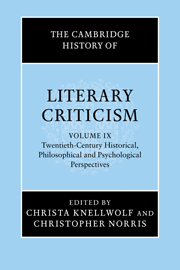Book contents
- Frontmatter
- Introduction
- HISTORY
- MARXISM AND POST-MARXISM
- 6 Marxism and literary criticism
- 7 Marxism and poststructuralism
- 8 Adorno and the early Frankfurt School
- 9 The ‘German–French’ debate: critical theory, hermeneutics and deconstruction
- 10 Post-war Italian intellectual culture: from Marxism to cultural studies
- FROM CULTURAL POETICS TO CULTURAL STUDIES
- PSYCHOANALYTIC APPROACHES
- GENDER AND SEXUALITY
- COLONIALISM, POST-COLONIALITY, NATION AND RACE
- MODERNITY AND POSTMODERNISM
- PHILOSOPHY, AESTHETICS AND LITERARY CRITICISM
- INTERDISCIPLINARY APPROACHES
- Bibliography
- Index
- References
9 - The ‘German–French’ debate: critical theory, hermeneutics and deconstruction
from MARXISM AND POST-MARXISM
Published online by Cambridge University Press: 28 March 2008
- Frontmatter
- Introduction
- HISTORY
- MARXISM AND POST-MARXISM
- 6 Marxism and literary criticism
- 7 Marxism and poststructuralism
- 8 Adorno and the early Frankfurt School
- 9 The ‘German–French’ debate: critical theory, hermeneutics and deconstruction
- 10 Post-war Italian intellectual culture: from Marxism to cultural studies
- FROM CULTURAL POETICS TO CULTURAL STUDIES
- PSYCHOANALYTIC APPROACHES
- GENDER AND SEXUALITY
- COLONIALISM, POST-COLONIALITY, NATION AND RACE
- MODERNITY AND POSTMODERNISM
- PHILOSOPHY, AESTHETICS AND LITERARY CRITICISM
- INTERDISCIPLINARY APPROACHES
- Bibliography
- Index
- References
Summary
The development of literary theory in the Federal Republic of Germany was deeply affected by demands at the end of the 1960s for new critical analyses of the intellectual traditions which played a role in Germany's catastrophic past. Despite the moves to ‘de-Nazify’ German society in the Federal Republic after the war, much of academic and other institutional life continued to be controlled by those who had at least been compromised during the Nazi period, if they had not been active Nazis. It was, above all, the Student Movement of the late 1960s and early 1970s which made an issue of the persisting role of such people, and of the affluence of a society that had so recently been morally, socially and economically bankrupt. The Student Movement concentrated on ideas in the Marxist tradition, including the Frankfurt School, which had been suppressed in the Nazi period and neglected in the immediate post-war years. These ideas were rather crudely deployed to question the legitimacy of capitalist economies in the west which were involved in supporting repressive regimes in the Third World. Such questioning was supposed to lead to revolutionary change, but it has since become clear that much of the energy invested in the idea of revolution in fact depended on feelings relating to the unresolved injustices of the Nazi period. The effects of the Student Movement on the humanities were evident in a tendency to disregard aesthetic issues in favour of approaches which looked at literary texts in particular solely as the products of historical and ideological conflicts. Even though these approaches were reductive, they did draw attention to weaknesses in theories of the inherently humanising or revelatory effects of art, which were still widely held, despite the events of the Nazi period. At the height of the Student Movement the more differentiated critical resources available in the work of Adorno and other members of the Frankfurt School were largely neglected.
- Type
- Chapter
- Information
- The Cambridge History of Literary Criticism , pp. 121 - 132Publisher: Cambridge University PressPrint publication year: 2001

